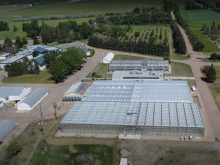GRAND COULEE, Sask. – Greg Menzies returned to Wigmore Farms, the family farm near Regina, a few years ago to help with one last harvest before the land was sold.
There was a tiny tug on his emotions; after all he’d spent a lot of time at the farm.
But Menzies is a businessman with 20 years in the high-tech industry in Vancouver specializing in international business management and marketing.
When his uncle suggested they buy the century farm and keep it in the family, Menzies began to look at it from his business perspective. It soon made sense.
Read Also

Alberta crop diversification centres receive funding
$5.2 million of provincial funding pumped into crop diversity research centres
He used his international experience and a different view of agriculture to set up a vertically integrated business model that takes Saskatchewan food to the world under the Wigmore label.
The privately held company includes four divisions – farm management, processing, export marketing and crop production products.
“The farm is the foundation of what we do,” Menzies said. “But you can’t underestimate any of the others.”
In the last three years Menzies, who is president and chief executive officer, has developed a company that farms about 18,000 acres, employs more than 40 people and specializes in processing and shipping pulses, particularly chickpeas.
He has expanded the on-farm facilities located near the bedroom community of Grand Coulee not far from the Trans-Canada Highway and Canadian Pacific Railway’s main line, and within sight of the proposed new intermodal shipping terminal. He plans another expansion this fall.
He has also lured the talent he needs to run a successful company.
Norm and Laura Shoemaker were one of two couples named Canada’s outstanding young farmers in 2007. The Mossbank, Sask., farmers were looking for ways to further their involvement in agriculture but found themselves capped in terms of available local land.
This past winter they became minority shareholders in Wigmore.
Norm is in charge of the farm management division, which manages the company’s own land and offers management services to other farmers or investors. Laura runs the crop production product division out of Avonlea.
They have moved from their farm but their land is farmed as part of the Wigmore operation.
They see their move as an opportunity to invest in the value chain.
“It’s a natural fit for us,” said Laura.
She had previously worked in the agricultural chemical retail industry. Wigmore’s crop production products division is built on the recent purchase of Dean Clarke Agri Services, an inputs retailer based in Avonlea with locations in south-central Saskatchewan.
“I’m Laura’s best customer,” Norm said.
He had a bit of a learning curve adjusting to different soil, weeds, weather and crop rotations.
But both are excited about the Wigmore concept and how each unit will operate separately but together to produce food at a lower cost.
Menzies said the fundamental idea is to make the business as lean as possible in order to provide better returns to farmers and still have a successful company.
“I’m passionate that each individual group has to run successfully,” he said.
In the Grand Coulee office, processing division manager Ward Hepting and plant operations manager and export marketer Jeff Jackson sit desk-to-desk.
Jackson is simultaneously on the phone and typing e-mails.
“The market today is so volatile,” he said during a break. “It’s exciting and especially for growers.”
Wigmore is set up to allow growers to take advantage of markets, he said, and make farms more viable.
“Vertical integration is the key,” added Hepting.
Wigmore has capacity to ship more than 40,000 tonnes annually from one kilogram packages to one tonne bulk bags. It markets around the world, with an emphasis on Kabuli chickpeas.
Hepting said the health benefits of pulses and chickpeas in particular continue to gain attention, especially with recent concerns about hunger and the food versus fuel debate.
That can only mean markets will continue to grow, he said. Wigmore is expected to grow as well.
Menzies said the company intends to expand its land base each year and help other farmers develop business plans that work for them.
Farming in North America is a different proposition than it once was, he added.
The exponential growth in China and India has shifted the focus away from North America at the same time that customers want to get closer to growers. That’s why traceability is so important.
Menzies also said while the Wigmore model can help stabilize Saskatchewan growers, he sees opportunities to take it elsewhere. He has already met with the agriculture minister of Bangladesh about transferring Saskatchewan farming expertise.
He continues to push the envelope at home. In 2007, Wigmore ran an 84-foot drill and this spring used 204 feet of air seeder – the 84-foot Seed Hawk, a 60-foot Concord and a 60-foot John Deere – to seed more acres in less time.
Menzies said whatever Wigmore does, it will do well.
“We are obsessed with growing the best crop possible,” he said.















